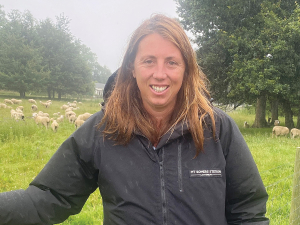DairyNZ Calls for Changes to Government’s Proposed Resource Management Act Reform
DairyNZ says the Government’s proposed Resource Management Act reform needs further work to ensure it delivers on its intent.
 Beef + Lamb NZ chair, Kate Acland says the organisation has consistently argued against agriculture being entered into the ETS.
Beef + Lamb NZ chair, Kate Acland says the organisation has consistently argued against agriculture being entered into the ETS.
The Government's decision to keep agriculture out of the New Zealand emissions trading scheme (ETS) has been roundly applauded by farmers.
Beef + Lamb New Zealand (B+LNZ) chair Kate Acland says it has consistently argued that agriculture going into the ETS would be a disastrous outcome.
“We welcome certainty about this being removed,” she says.
DairyNZ chair Jim van der Poel says the announcement is positive, following a huge amount of uncertainty for dairy farmers.
“New Zealand’s dairy farmers are among the world’s most greenhouse gas-efficient producers of milk, and inclusion in the NZ ETS could have shifted production to less-efficient producers offshore, hurting farmers, the economy and the country. That outcome would also increase global emissions.
“To remain internationally competitive, all paths forward must be grounded in a science-based approach. This will ensure a profitable and sustainable future for dairy – and for the rest of New Zealand,” he says.
On the eve of the Fieldays last week, the Government announced that it was delivering on its election commitment to ag agriculture out of ETS. It also announced a new Pastoral Sector Group to constructively tackle biogenic methane. An industry-wide group, He Waka Eke Noa, which was set up under Labour to reduce greenhouse gas emissions will also be disbanded.
Agriculture Minister Todd McClay says New Zealand farmers are some of the world’s most carbon-efficient food producers.
“The Government is committed to meeting our climate change obligations without shutting down Kiwi farms. It doesn’t make sense to send jobs and production overseas, while less carbon-efficient countries produce the food the world needs.
“That is why we are focused on finding practical tools and technology for our farmers to reduce their emissions in a way that won’t reduce production or exports.”
Acland backed the disbanding of HWEN, noting that B+LNZ withdrew its support because of the significant impact this would have had on farmers.
But Acland had a message for the Government as well.
“While we are prepared to be part of a new group that discusses how to manage New Zealand’s agricultural emissions, any involvement will be with full transparency and discussion with our farmers.
“We will not allow this to be a repeat of the He Waka Eke Noa process.
“We are being very clear to the Government that our bottom line is that we do not support a price on agricultural emissions as a way of achieving reductions.
“Emissions reductions in the sheep and beef sector are already happening more quickly than needed.
“The significant decline in stock numbers because of afforestation in the last few years means our sector will likely exceed the current target of a 10% reduction in methane by 2030.
“Based on this there is absolutely no justification for a price. This is a non-negotiable for our farmers.”
Budou are being picked now in Bridge Pā, the most intense and exciting time of the year for the Greencollar team – and the harvest of the finest eating grapes is weeks earlier than expected.
The Real Estate Institute of New Zealand (REINZ) has released its latest rural property report, providing a detailed view of New Zealand’s rural real estate market for the 12 months ending December 2025.
Rural retailer Farmlands has released it's latest round of half-year results, labeling it as evidence that its five-year strategy is delivering on financial performance and better value for members.
OPINION: "We are back to where we were a year ago," according to a leading banking analyst in the UK, referring to US president Donald Trump's latest imposition of a global 10% tariff on all exports into the US.
DairyNZ says the Government’s proposed Resource Management Act reform needs further work to ensure it delivers on its intent.
Overseas Trade Minister Todd McClay says he's working constructively with the Labour Party in the hope they will endorse the free trade agreement (FTA) with India when the agreement comes before Parliament for ratification.

OPINION: A mate of yours truly reckons rural Manawatu families are the latest to suffer under what he calls the…
OPINION: If old Winston Peters thinks building trade relations with new nations, such as India, isn't a necessary investment in…